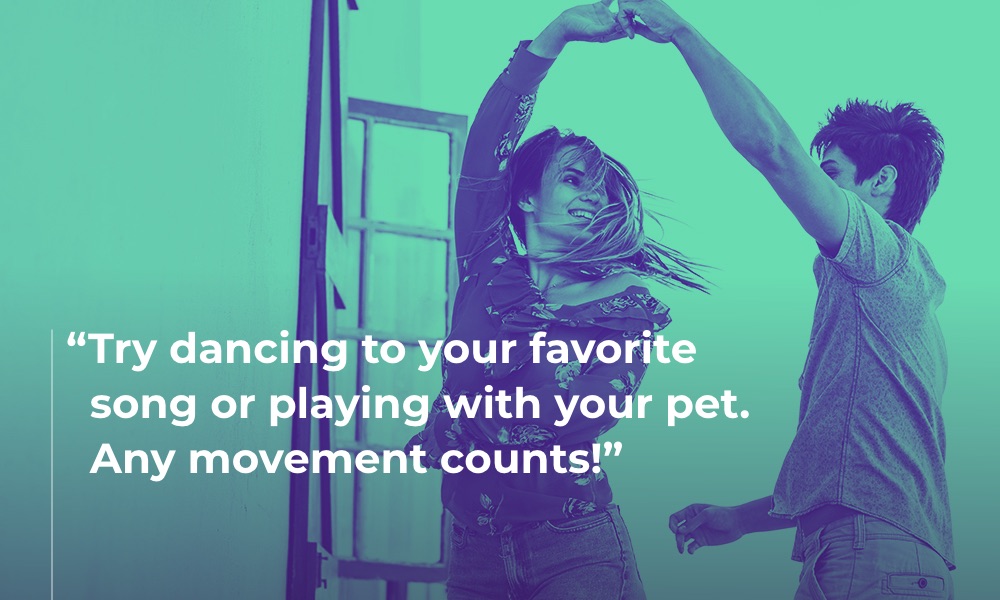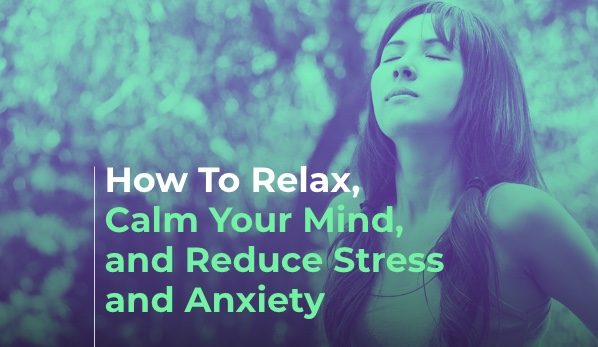Relaxation seems like it should come easily to us, but the reality is that it can be hard to let go and loosen up. Especially for high performers, relaxation can feel incredibly challenging. Yet, those of us who are constantly on the go are the ones who need to relax the most. In fact, if you don’t take time to decompress and practice self-care, you’re at risk for burnout and a host of physical and mental health issues down the road.
But how do you relax? There are a whole host of relaxation exercises that can help even the most stressed-out people calm down and release tension. With that in mind, let’s learn how to relax!
Different Ways to Relax

Ways to Relax Your Body
Although it may sound counterintuitive, sometimes it works best to focus on calming your body even when your goal is to calm your mind.
Chances are that once your body feels relaxed, your mind will follow. When your body relaxes, you enjoy a slew of health benefits. In a relaxed body, heart rate slows, blood pressure levels out, and muscles loosen (leading to less joint pain).
Practicing regular relaxation techniques may provide you with a boosted immune system and improved sleep. Plus, you may experience a decrease in gastrointestinal problems as you incorporate more relaxation into your days.
We’re all a little different, and there are as many ways to relax as there are people in the world. So if one of the activities on this list doesn’t help you wind down, don’t be discouraged. It’s a great idea to try a few different techniques and see what works best for you.
If you find yourself with a tight feeling in your chest, a clenched jaw, a tension headache, or shoulders up to your ears, take 10 minutes to try one of these techniques.
Practice Breathing Exercises
Many different deep breathing exercises can help you calm your nervous system, so try several to see which you prefer. One easy technique to start with is called box breathing. To do it, inhale to the count of four. Then, hold your breath for a count of four. Next, exhale to the count of four. And finally, hold for a count of four before inhaling again.
Get a Little Exercise
When you’re stressed or anxious, it’s understandable that you may not want to work out. However, studies show that physical activity is extremely effective at relieving stress. As Kelly McGonigal, Ph.D. and author of “The Joy of Movement,” says:
“If you are willing to move, your muscles will give you hope. Your brain will orchestrate pleasure. And your entire physiology will adjust to help you find the energy, purpose, and courage you need to keep going.”
You don’t need to have a formal workout routine to get moving. Try dancing to your favorite song or playing with your pet. Any movement counts!
Take a Hot Bath
Hot water has a relaxing effect on your muscles, leading to a sense of full-body calm. For the most calming effect, we suggest leaving your phone in the other room and sticking with soothing music or simple silence.
Practice Yoga, Tai Chi, or Other Mindful Movement Exercise
Exercise, regardless of the type you’re doing, produces endorphins and helps with stress management. But exercise classes that promote a mind-body connection, like yoga and tai chi, are especially beneficial for reducing stress levels and anchoring you in the present moment.
Go for a Walk in the Sunshine
When our bodies are exposed to sunlight, it triggers the production of serotonin, a mood-stabilizing chemical that’s excellent for decompressing.
Indulge in a Warm Beverage
The soothing ritual of drinking a hot cup of herbal tea or a latte is relaxing enough on its own. But warm beverages can also improve your circulation, reducing muscle tension and promoting a calm body.
Try Acupuncture
While having needles poked in your body may not seem very relaxing at first, there’s a reason acupuncture is a time-honored tradition. Studies show that acupuncture reduces the stress response in humans, helping you to chill out.
Practice Aromatherapy
Aromatherapy is the use of fragrant plant extracts and essential oils for therapeutic purposes. Smelling (and sometimes topically applying) these oils can help you feel centered and calm. Plus, some studies show that aromatherapy using lavender essential oil can reduce anxiety.
Try Progressive Muscle Relaxation
Progressive muscle relaxation is a technique in which you tense and then relax your muscle groups. This technique helps relieve anxiety and promotes relaxation. To do it, begin by tensing the muscles in your forehead for 10 seconds, then slowly releasing them for 30 seconds. Do this for each muscle group, moving all the way down to your feet.
Get a Massage (or Give One to Yourself)
Massages do more than just feel great; studies show they can help you reduce stress, especially when combined with essential oils and aromatherapy. Consider this your excuse to book a self-care day at an all-inclusive spa.
Try Gentle Stretching
You don’t have to commit to a full yoga session to reap its benefits. Even gentle stretches like touching your toes or reaching your arms above your head will get your blood flowing. Moving your body mindfully can center you in the present moment, helping you to relax.
Cuddle With a Pet
If you need to relax, find your pet and give them some love. Studies show that petting a cat or dog leads to a reduction in cortisol, the hormone that’s emitted when you’re stressed. You already knew that cuddling with your favorite furry child made you feel good, but now you know why.
Things To Do To Relax Your Mind
Relaxation not only helps your physical health but your mental health as well. Adding relaxation to your days can help you think more calmly and clearly. A relaxed mind also means you can perform better at work and in life. It helps you manage the chronic stress that sometimes comes with being a high performer. When your mind is relaxed, you make wiser decisions and generally operate throughout the day with more ease.
Plus, if you’ve been diagnosed with a mental health disorder, like generalized anxiety disorder or depression, relaxation can play an important role here, too. While stress can aggravate these conditions, relaxation tends to have the opposite effect, leading to a noticeable decrease in symptoms.
If you find yourself caught up in anxious thoughts or ruminating on past events, it’s a good time to relax your mind. Try one of these exercises to slow down your thoughts and ground yourself in the present moment.
Have a Laugh
When you’re feeling stressed, put on your favorite comedy or call your funniest friend. Laughter not only distracts us and gives us perspective, but emerging research suggests that it can lessen stress too.
Spend Time With Loved Ones
When we’re anxious or stressed out, we tend to isolate ourselves. But in order to relax, we need to be around our community. Science tells us that social support is critical in helping us respond to stress.
Make a Gratitude List
When you need to calm down, it can help to reorient your focus. Shift your focus from the things that make you feel anxious to the things that make you feel thankful. It’s scientifically proven to make you feel better.
Try Visualizations
If you’ve ever gotten lost in a daydream, you know that visualization can be a powerful tool. Envisioning calming scenarios can reduce anxiety. Try using a guided app like Primed Mind to lead you through a calming visualization.
Listen to Music
Music is a powerful tool for changing our moods. And research shows it can reduce stress. Try putting on your favorite song or some upbeat classical melodies next time you need to relax.
Turn Off Your Tech Devices
It’s hard to relax when your phone is constantly buzzing or your email inbox is pinging. It can make you feel like there’s a task you need to urgently attend to, even when there isn’t one. Try shutting your phone off for an hour (or even a whole day), and see how it affects your mood.
Do a Craft Project
Getting creative is a great way to enter a flow state. A flow state is when you’re fully immersed in what you’re doing. When you’re in a flow state, you’re more likely to relax since you’re not dedicating any mental energy to worry or stress.
Take Up Journaling
Studies show that journaling has similar benefits to going to therapy. You may want to try the “morning pages” technique, popularized by author Julia Cameron. To practice this, you start the day by writing down whatever comes to mind for the length of three notebook pages. It’s an excellent way to get all of your stressors out before the day begins.
Make Time for Hobbies You Enjoy
Whether you’re into lifting weights, knitting, or simply taking your dog to the park, it’s beneficial to make time for it. Science tells us that participating in a regular hobby reduces stress and improves your well-being, helping you feel relaxed.
Spend Time in Nature
Heading into the great outdoors is an excellent way to calm down. Research shows that regular time spent among the trees reduces stress. Plus, you get the added benefits of exercise and sunshine.
Practice Being Present
If you choose only one relaxation technique from this list, this should be the one. Practicing presence through mindfulness and meditation (more on that later!) is key to feeling relaxed. This is because when you’re living fully in the moment, it’s not possible to feel anxious or stressed. Instead, all of your attention is focused on whatever you’re doing.
Spend Some Time in the Sauna
Just like a hot bath can help your tense muscles relax, so too can a sauna’s warm environment. If one is available to you, try spending 10 to 15minutes in it regularly to experience the most benefits. Studies also show promising results for longevity and mental performance with consistent sauna use.
Clean Up Your Space
When your living or working space is cluttered, it can make your mind feel cluttered too. Even if you’re not feeling up to it, try taking five to ten minutes to clean up your environment. You might be surprised at how much calmer you feel.
Meditation for Relaxation
Our number one suggestion for relaxation is a regular meditation practice. Meditation benefits both your body and mind. In fact, studies show it reduces stress, lessens anxiety, reduces pain, and lowers blood pressure. Just a few minutes of meditation can set you up to feel relaxed for your entire day.
Primed Mind is a guided meditation app designed to help you fit meditation into your day whenever it works best for you. The app uses mindset-focused audio recordings to help you relax and experience stress relief.
Created by one of the world’s leading mindset and performance coaches, our audio primers help you create positive behavioral patterns and encourage change in your daily life. You can pick a one-off session like “Wind Down and Relax” or take a seven-day course to dive deeper into reducing stress and improving well-being.
How To Relax More
You’ll feel the most benefits from relaxation when you incorporate it into a regular wellness routine. Here are a few ways to do that:
- Try scheduling time for relaxation into your daily calendar, and commit to it the way you would any other important obligation. It doesn’t have to take a long time. Even just a few minutes of decompressing can make a world of difference.
- If you’re used to doing high-impact workouts during the week, switch to something low-impact, like yoga or swimming, once or twice a week to give your mind and body a break.
- Make time for a relaxing hobby, like watercolor painting, going for a hike or bird watching, for example, a couple of times a month.
- Block off time on your least-busy day of the week to do nothing, whatever “nothing” means to you. That may mean lying in bed listening to music or reading an indulgent book. The point is not to pressure yourself to be productive.
Frequently Asked Questions About How to Relax
If you’re new to prioritizing relaxation, it can seem overwhelming. So we’re addressing a few of the questions we get most about relaxation and staying calm.
How Can I Relax Fast?
If you’re feeling very stressed or panicked and need to calm down quickly, we recommend progressive muscle relaxation. It’s proven to lower your heart rate, helping you to feel more at peace.
To do progressive muscle relaxation, begin by tensing the muscles in your forehead and then releasing them. Do this with each muscle group all the way down to your toes.
If you prefer to do something different, you can also try breathing exercises to calm down quickly. Even taking a couple of long, deep breaths is enough to slow your heart rate and help you feel more relaxed in the present moment.
You can also try a quick meditation to regain your sense of calm. We recommend this five-minute session to help you chill out.
What Is The Best Way To Relax?
The best way to relax is entirely personal and may depend on what you are currently dealing with in your life. Try out a few of the different techniques for your mind and body and see what you enjoy most. Sticking to a technique consistently will help you reap the benefits and help you truly find what the best way to relax for you is.
What Should I Do if I Can’t Relax?
Sometimes, it can be very hard to calm down, but rest assured that it’s never impossible. Even the most panicked feelings eventually end.
When you’re struggling to relax, it’s a good idea to change your environment. Go for a walk around the block, around the office, or even around your apartment. It can really help to get your body moving and change your surroundings.
Learning How To Relax and Manage Stress with Primed Mind
When you don’t make relaxation part of your self-care routine, your performance and well-being suffer. Luckily, there are countless ways to calm down and chill out. For a daily go-to dose of relaxation, try Primed Mind. We make rapid relaxation available to you wherever you are, with sessions that help you unwind and let go of stress and anxiety. Check out Primed Mind today to say goodbye to stress and hello to relaxation.





